By Aline Reynolds
As Occupy Wall Street enters its eighth week, members of the movement who continue to camp out in Zuccotti Park are testing out a new way to come together and make decisions.
O.W.S.’s new, consensus-based model, dubbed “Operational Spokes Council,” is meant to address the logistical needs of the park’s inhabitants that members say are being neglected by their nightly General Assembly meetings.
The Spokes Council, intended to be “nonhierarchical” and “directly democratic,” is supposed to facilitate discussions solely among “operational” working groups, or groups directly involved with the occupation at Zuccotti Park, according to a written proposal of the model posted on O.W.S.’s G.A. Web site.
A talking point of several recent O.W.S. meetings, the model was initially proposed in mid-October, after the nightly G.A. became too large and diffused to meet day-to-day operational demands of the park.
On Fri., Oct. 28, the Spokes Council was voted into implementation by the G.A.
Gregory Schwedock, a member of O.W.S.’s alternate banking working group, compared the Zuccotti Park encampment to “a town that seems to be overflowing.”
“The General Assembly is a great body, but it’s not conducive to getting logistics handled at the speed that they need to,” he said.
The Spokes Council is poised to solve that problem by becoming “an extremely effective body to get work done,” according to Nicole Carty, a member of the structure and facilitation working groups.
Carty stressed that the council is not a forum for discussion of the movement’s overall vision or ideals, which are handled by O.W.S.’s “movement” groups.
“It only has to do with, ‘Who’s going to clean the park? Who’s going to make the tents?’ Things like that,” she said.
According to the proposal, the Spokes Council will also address issues brought up by caucus groups, or groups of O.W.S. members that feel mutually marginalized with respect to race, gender, sexuality, age or ability.
According to the proposal, Democratic movements dating back to the 1936 Spanish Revolution have benefited from the Spokes Council model to streamline insurgencies, as have more modern groups, including the anti-nuclear movement of the 1970s and ’80s, and the global justice movement of the ’90s and 2000s.
“The reason why we did this is so we’re not micromanaging operational groups,” said Ryan Hoffman, who wrote O.W.S.’s initial declaration that spread to dozens of countries worldwide.
The food working group, for example, shouldn’t have to report to the G.A. every time members seek to raise their budget; while the medical working group shouldn’t require G.A. approval to solicit additional funds.
“It’s ridiculous,” said Hoffman.
“This ‘100 percent consensus, everybody in a giant room’ approach, especially when you can’t use any microphones or P.A. systems or bullhorns, is becoming just patently absurd,” echoed Lucius Ringwald, a member of O.W.S.’s mental health and safety working groups.
“We need to actually have some level of delegation, some level of people being identified as point person, with the consent of those they’re representing,” Ringwald said.
About 150 O.W.S. members convened for a Spokes Council orientation meeting last Fri., Nov. 4, in the public atrium of 60 Wall St. to brainstorm ideas for discussion topics for future Spokes Council meetings. Carty and a couple other lead working group members ran the meeting.
Demonstrators spouted ideas that they believe warrant ongoing dialogue, such as the use of park space, Internet access, safety, supplies and food.
Next came the “mock proposals” session, when participants jokingly proposed to abandon Zuccotti Park for an indoor space, and spoke sardonically about Mayor Bloomberg supplying sleeping bags tagged with the message, “Corporations Are People” to the occupiers.
Spokes Councils are organizationally structured like the spokes of a wheel, in that each operational working group is supposed to select a “spoke,” or an individual that represents its wishes during Spokes Council meetings. While the “spokes” are the only individuals that are supposed to speak during the council meetings, they rotate, can be recalled by their group at any time and do not make decisions or voice opinions without consensus in their respective groups.
Typically, spokes will bring forth proposals to the Spokes Council only if 90 percent of members within the respective working group or caucus support it. Working groups and caucuses may block or table proposals introduced at the council meetings if more than 50 percent of the groups stand aside — unlike in the G.A., where individuals can block proposals.
“It’s called ‘modified consensus’ — we aim for consensus first, which is 100 percent,” explained Carty.
While all decisions made by the Spokes Council will be discussed during the General Assembly meetings, they don’t require G.A. ratification, noted Carty.
O.W.S. held its first official Spokes Council meeting Mon., Nov. 7, in the cafeteria of Murry Bergtraum High School, at 411 Pearl St., where an estimated 60 O.W.S. working groups requested to become a part of the council.
Of these 60, about a dozen working groups were chosen. However, Carty and other representatives were only able to get through less than one-third of the proposals.
“We literally had pieces of paper for each group to register, and we spent most of the time putting these groups in different stacks,” Carty said.
Carty reported a handful of disruptive moments during the meeting, such as when the Direct Democracy working group sought to disband the Spokes Council altogether. Direct Democracy members weren’t immediately available to comment.
Hoffman attributed the contention that arose at Monday’s meeting to “growing pains.”
“Everyone is nervous of the Spokes Council being something resembling a power structure,” said Hoffman. “It’s just a sorting-out of the egos. Next time, it’ll be a lot easier.”
Depending on the model’s success, the council might multiply into several councils.
“It’s a tool for developing conversation,” Carty said. “Any group that feels like they’ve grown too big to have an easily facilitated meeting can have a Spokes Council.”
Hoffman, however, cautioned that multiple Spokes Councils could create the same inefficiency problems the G.A. has been grappling with.
“It would create sectarianism and overlap — and that’s exactly what the Spokes Council was created to prevent,” said Hoffman.
Meanwhile, Carty and fellow structure and facilitation working group representatives were already planning the council’s Wed., Nov. 9, meeting in hopes that it would run smoothly.
“We’re going to give five minutes for each group,” Carty noted. “If we can’t come to a consensus at the end of five minutes, we’ll drop them down to the next round.”
At some point, Carty said, “We have to draw a line as to when we’re going to just start doing work.”
Spokes Council meetings will be held Mondays, Wednesdays and Fridays at 7 p.m., at locations to be determined; the General Assemblies will continue to take place at Zuccotti Park on Tuesdays, Thursdays, Saturdays and Sundays, also at 7 p.m. For more information on both, visit the General Assembly Web site (nycga.net).



































